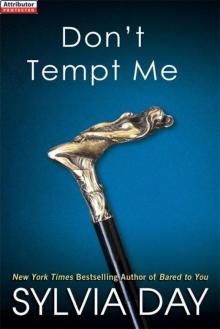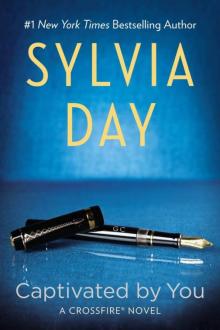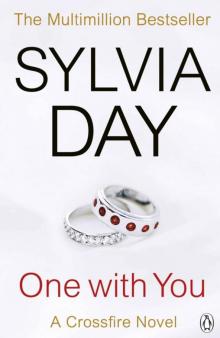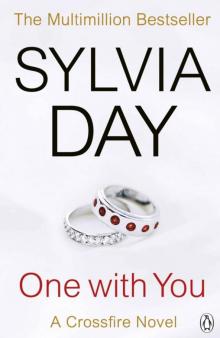- Home
- Sylvia Day
Don't Tempt Me Page 11
Don't Tempt Me Read online
Page 11
Now, mere hours later, he was embroiled in the life of a woman who would certainly bring him nothing but grief.
However, there was no help for it at this point. He was fascinated and he had never been able to resist exposing the cause of any fascination.
Mysteries were meant to be solved.
Simon watched Desjardins and Mr. James settle the injured woman into a carriage, and wondered why and how the comte’s plans had altered so drastically over the course of the day. That morning the comte had enlisted Lysette’s assistance in reaching James, but tonight Lysette had been in his arms, while Desjardins and James appeared to be rubbing along well on their own.
The situation unsettled Simon, causing the hairs on his nape to stand on end and tension to stiffen his spine. Something was amiss and Lysette’s sudden change of heart was beyond suspicious. Mindless with lust, he had not cared about her motivations. He’d cared only about pushing inside her and staying there until he could think again.
Frustrated by the sudden sensation of being played the fool, Simon growled and continued his journey to the back of the manse. He glanced at every window as he passed it, searching for any signs of occupation. He hoped everyone was safely free of entrapment. His eyes lit on the destruction of one window and a shattered chair beneath it. Glass littered the gravel pathway and bore testament of a desperate attempt to stay alive.
How in hell had this happened?
Simon gained the terrace and was relieved to see that the line of water carriers continued to work industriously.
He rejoined them, working past the sunrise, his thoughts actively occupied with the mystery Lysette, Desjardins, and James presented.
Chapter 8
“What in bloody hell happened to you?” Eddington queried as Simon stumbled through the front door shortly after nine in the morning.
The fresh, clean fragrance of the interior of his home was a welcome relief after smelling nothing but smoke the entirety of the long night. Simon glanced at his sweat-soaked and soot-covered garments and knew the entire lot would have to be destroyed. The burnt odor was now permanently ingrained in the cloth. In contrast, the earl was freshly bathed and wearing a comfortable robe.
“You are buying me a new wardrobe,” Simon growled, shrugging out of his coat, an action that caused ash to sprinkle down to the rug.
Eddington’s nose wrinkled. “Good God. You are a disaster.”
“The Baroness Orlinda’s home caught fire during the ball.” Simon brushed past the earl on his way to the stairs.
“An accident?” Eddington fell into step behind him.
“So it would appear. A poorly secured lamp in the gallery.”
“What are the odds?”
Simon snorted.
“Was anyone injured?”
“Smoke inhalation and some minor burns. Miraculous, really, if you saw the state of the manse.”
Pushing open the door to his room, Simon absorbed the familiar feeling of homecoming. He had purchased the house as is, with furniture and art included. The man who had owned the place previously must have had an affection for slumber. The bed was massive and comfortable, the drapes thick and dark, the rugs plush and warm. The palate of dark reds, greens, and stained walnut furnishings created a soothing, masculine retreat.
“That is not the worst of it,” Simon muttered, stifling a yawn and shooting a longing glance at his turned-down bed. His valet took one look at him and quickly tossed a towel over a footstool, so that Simon could sit and remove his boots. Then the servant excused himself to arrange a bath.
“There is more?” Eddington asked, wide-eyed. The elegantly tall earl moved to one of the wingbacks in front of the grate and smiled at the pretty maid who was stoking the fire into a hearty, welcoming blaze. She flushed prettily and bobbed a quick curtsy before retreating, leaving the two men alone.
“Mademoiselle Rousseau attempted to seduce me.”
“Attempted?” There was laughter in the earl’s voice and Simon glared at him.
“Yesterday morning she was set on luring Mr. James to an ignoble end, and last night James and Desjardins were working in tandem while she was after me.”
“Interesting,” the earl murmured. “What are your thoughts?”
Arching a brow, Simon stood to remove his waistcoat and shirtsleeves. “My thoughts are that you will return my coin to me whether I complete the task agreed to or not. If they have set me as a target, our agreement will not be forfeit nor substituted.”
“What leverage do you have to enforce this?”
Simon raised his fists.
Eddington shuddered. “Point taken.”
It was Simon’s pugilistic expertise that had first caught the earl’s attention. Simon had taken down nearly a dozen men with only minor bruising to show for his efforts, and Eddington had immediately decided that he could use a man of such talent. Since Simon’s position as Lady Winter’s paramour was eliminated by her marriage, he gratefully accepted the employment. In short order, Simon proved he was as agile of mind as he was on his feet.
“You think they mean to implicate you?” Eddington asked thoughtfully. “If you were accused of crimes against Franklin and your work for the English Crown was to become known, it would increase the animosity toward England with both the French and the Revolutionaries.”
“That is certainly possible,” Simon agreed, pulling his shirt over his head and reaching for the fastenings of his breeches. “There were other oddities last night. While Desjardins and James were occupied with each other, Lysette waited with two other females.”
“Who were they?”
“I am not certain. Truly, I did not pay much attention to either of them, other than that they surrounded her as mother hens would. Lysette is not the type of woman that other women like. I know you collect what I mean.”
“Curious.” Eddington set his elbows on the armrests and brought his steepled fingertips to his lips. “What do you intend to do?”
“I am going to bathe, then sleep.” Simon moved toward the bathing chamber, where the splashing of water told him the tub was being readied. “After that, I will visit Mademoiselle Rousseau and ask her outright.”
“You think she will tell you?” the earl called after him.
“No. But at least she will know that I am not ignorant of something being amiss.”
“You might wish to enlist aid.”
“I might,” Simon said evasively, having already planned to do just that. However, that was not information he wished to share with the earl.
“I will see to it,” Eddington offered. “I have asked Becking to remain in France while I am here. Might as well put him to good use.”
“Excellent, my lord.”
He shut the door behind him.
Edward awoke due to a ferocious spate of coughing. He sat up from his reclined position in a chair and glanced around the room, briefly surprised to find himself still in Corinne’s house. The last thing he remembered was listening to the physician’s orders to keep her cool if she turned feverish and to suction out her mouth and nose at regular intervals so that she could breathe.
He glanced at the clock on the mantel. It was shortly after nine in the morning.
Pushing to his feet, Edward stretched muscles cramped by hours spent sleeping in a wingback. He was late for work, something he had never been in the entirety of his life. He needed to return home immediately, where he could draft a note to Franklin in explanation, bathe, and prepare for the day.
Glancing quickly around the room for any of his belongings, Edward then moved to the door that separated the private sitting room he occupied from Corinne’s bedchamber. He knocked lightly, waited for an acknowledgment that did not come, and opened the door regardless.
While the sitting room was decorated in a mixture of various shades of cream and brown with stained wood molding and furnishings, the bedroom was far more feminine with its palette of pale pinks and burgundy with whitewashed wood and gilt. But both rooms were permeated w
ith the soft floral scent that belonged to Corinne alone. It was innocent, not seductive, yet he was drawn to it.
As he stepped deeper into the space, Edward’s gaze locked on the tiny form in the middle of the large four-poster bed. Her chest rose and fell in rapid, shallow breaths and black mucus bubbled from her nostrils. Furious, he rounded the chair where the housekeeper sat, intent on a scolding, and found the elderly woman sleeping and completely oblivious to the needs of her employer. The woman’s lace-fringed cap was askew and covering her lined brow, allowing messy gray curls to peek out from the left side.
Growling his frustration, Edward approached the bed and managed the onerous task of suctioning Corinne’s airways, inwardly thinking that he’d never been a nursemaid in his life. Even when he was the patient, he did not nurse himself to health. He hadn’t the time or funds to do more than work through whatever illness affected him.
When he had finished, Edward dipped a clean cloth into the bowl of water on the nightstand and wiped it gently over Corinne’s pale face, admiring how beautiful she was even when afflicted. Her brows were perfectly arched, her mouth lushly curved, her cheekbones high and elegant.
It pained him to see her so helpless and he knew that her staff of three servants—housekeeper, butler, and their son, the footman—were not enough to provide the care Corinne needed. If he wanted her alive, which there was no doubt he did, he would have to care for her himself. He could not afford to supplement her staff, even briefly, and he did not understand the nature of Comte Desjardins’s relationship with her enough to ask for assistance. It was also not his place to speak on Corinne’s behalf. They were strangers.
“Damn you,” he whispered, agitated by the complication she presented. A frown marred her brow in response to his gruff tone and he touched the line with the pad of his thumb, smoothing it away.
Edward sighed and left the room, taking the stairs to the main floor and searching out the kitchen. There, he found the butler and footman dealing with a driver making deliveries at the service door.
“Mr. James,” the butler said, bowing. It was a lame bow, the man’s old frame twisted by what Edward suspected was arthritic pain. He doubted they would be able to manage the household, small as it was, without the assistance of their strapping son.
“Madame Fouche is sleeping upstairs,” Edward replied in a curt tone. “I saw to Mademoiselle Marchant myself, but she will need to be watched by someone awake and the orders of the physician followed every half hour.”
“Yes, of course.” The servant had the grace to flush, but not the sense to admit that he needed help.
“If you can tend to her during the day, I will return to see to her at night.”
“Sir,” the butler began, straightening as best he could. “Your offer, while generous, is not necessary, I assure you. There is no need to trouble yourself.”
Edward smiled grimly. “I will return this evening. If you still feel the same, I will leave.”
There was nothing the man could say to that beyond repetitious protestations, so he simply bowed his head again and shot a warning look at his son.
For his part, Edward strode from the room at his customary brisk pace and collected his jacket from the foyer.
He glanced at the clock again on his way out and sighed. He hated to be late.
The courtesan’s house was small but elegant and located in an area of the city where only the most successful purveyors of the trade could afford to live.
The procession of carriages and riders on the street was steady, though not heavy, so lengthy observance of any household would be noted in short order. Because of this, the upper-floor chambermaid was hard pressed to slip from Solange Tremblay’s home and reach the unmarked carriage across the road in a timely manner. It was not easy, not with the housekeeper forever scolding her to complete three chores at once. Still, she was nothing if not wily.
Keeping her head bent low, she walked a small distance up the street, then crossed it and backtracked to the nondescript black equipage. She paused outside the door.
“Well?”
The black curtains were closed, preventing her from seeing who spoke to her. Not that she cared what he looked like. His coin was good and that was all she needed to know.
“They have made no plans to leave.”
“I see.”
There was something sinister in the tone used to say the two words. It made her shiver.
A gloved hand was extended and in its palm rested a small purse. She accepted it and dipped a quick curtsy, although she doubted he could see it. “Merci beaucoup, m’sieur.”
It always paid to be polite to those who paid you. She might argue with the housekeeper, but she was nothing but smiles to Mademoiselle Tremblay. If she was released from her position due to insubordination, L’Esprit would have no further use for her and she would lose both wages at once.
She began walking back the way she had come, her steps hurried in an effort to return to her station before her absence was noted.
L’Esprit watched the woman until she disappeared through the side gate leading to the servants’ entrance. She did not look back at him, a tiny detail he appreciated. It was so hard to find good help.
He leaned back against the squab and rapped on the roof. The coachman set the carriage into motion with a sharp whistle.
Marguerite had returned to Paris.
He had expected as much, which was why he’d paid the maid to join Solange’s household so many years ago. It was a simple, relatively inexpensive thing to keep the woman on retainer, and he had known that one day the expense would prove valuable.
Nothing could be allowed to alter the course of events put into motion two decades ago.
Most especially not Marguerite Baillon.
Corinne’s house was quiet as a tomb by five o’clock in the evening.
Edward sat at her dainty escritoire and worked quietly, his gaze moving to the bed at regular intervals to monitor her breathing. He had returned just a little past four and found her raging with fever and incoherent. The staff was exhausted. The footman had run to and fro for water all day and the housekeeper had given Corinne cooled cloth baths until her arms were protesting their exhaustion with tingling aches. When Edward arrived, they had conceded Corinne’s care to him with undisguised gratitude. He in turn, appreciated the many hours he had spent researching how best to care for an invalid in her condition.
He had immediately relocated her to a guest room. There, Madame Fouche removed the soiled night rail from her body, while Edward stripped her bed and remade it with fresh linens. He’d ordered that Corinne be bathed again and that vodka should be rubbed beneath her arms, behind her neck, and into the soles of her feet. She smelled like a drunkard now, but her temperature had cooled considerably. She’d then been swaddled like a child and he had returned her to the comfort of her freshly made bed.
In appreciation for their efforts, the Fouches had been dismissed early. Their son, Thierry—who was around the same age as Edward’s score, ten, and three years—remained in service. With only two people left awake in the house, it was eerily silently in contrast to the explosion of activity just an hour ago. The thick blanket of peace left Edward with too much time to contemplate his involvement in Corinne’s life and too little in the way of answers.
That was why, when the door knocker was rapped impatiently, Edward felt relief. It was a distraction when he felt in desperate need of one.
He paused with his quill suspended above parchment, his hearing alert. A moment later he heard voices, too distant to be distinguished. Expecting Desjardins, he waited for the sound of footsteps approaching. When they did not come, Edward pushed to his feet and walked through the open door into the gallery.
From there, he looked directly down the stairs into the small, marble-lined entry. Thierry stood in the front doorway, speaking at length with whoever stood there. Finally, the servant retreated into the house and closed the door.
Curious as
to who else occupied Corinne’s life, Edward rounded the landing and entered the upper parlor. He moved to the window and pushed the curtains aside, affording him a clear view of the street in front of the house.
The man named Quinn was unhitching his horse from the post with casual ease. The cut and quality of the man’s garments spoke of wealth and privilege, as did the beautiful lines of his mount.
How did he know Corinne?
Quinn stilled just before placing his booted foot into the stirrup. He glanced over his shoulder at the house, lifting his gaze until it met with Edward’s. The tension that gripped the man’s large frame was tangible even across the distance between them.
There had been a brief moment when Edward considered backing up and out of view. It was not his place to intrude in Corinne’s life. They were nothing to each other, not even true acquaintances. When she awoke, she might rail at his arrogance in taking charge of her household—and her—while she was helpless to protest.
But a long-buried part of him reared up and exerted a claim on the lovely Corinne, and he was unable to resist it. He would have her. It was the only reason for the madness of his actions since meeting her.
Edward’s eyes examined the man who might be a rival, noting every detail. They were as opposite as opposite could be, except for their facial expressions. Quinn looked the way Edward felt—taut, challenged, and malevolent.
Was this the man who had so wounded Corinne? Who had made her fearful and given her that haunted look in her eyes?
His fists clenched at his sides. “I will know who you are,” Edward warned softly.
Quinn touched the brim of his hat, smiled in a near sneer, and mounted his horse. He could not have heard Edward or even seen his lips moving, but the fact that he’d picked up the gauntlet was clear.
Another complication in an already tangled affair.
Edward lowered the curtain and returned to Corinne.
Simon stood in the entryway of his home and pulled off his gloves one fingertip at a time, his movements deliberate and evenly paced. The action was meant to calm him, but it was ineffectual. His breath heaved with his anger, and his neck ached with tension.

 Bared to You
Bared to You Passion for the Game
Passion for the Game Reflected in You
Reflected in You Entwined With You
Entwined With You Hot in Handcuffs
Hot in Handcuffs The Stranger I Married
The Stranger I Married Men Out of Uniform
Men Out of Uniform Don't Tempt Me
Don't Tempt Me Misled
Misled Captivated by You
Captivated by You Snaring the Huntress
Snaring the Huntress Kiss of the Night
Kiss of the Night In the Flesh
In the Flesh Hot in Handcuffs: Three Novellas of Erotic Capture
Hot in Handcuffs: Three Novellas of Erotic Capture Afterburn
Afterburn A Passion for Him
A Passion for Him What Happened in Vegas
What Happened in Vegas One With You
One With You Marked: Warfare and Sin City (Marked City Book 4)
Marked: Warfare and Sin City (Marked City Book 4) Scandalous Liaisons
Scandalous Liaisons The Arrangement
The Arrangement Taking the Heat
Taking the Heat A Hunger So Wild
A Hunger So Wild Blood and Roses
Blood and Roses Wish List
Wish List Adrian: Bonus Material for a Touch of Crimson
Adrian: Bonus Material for a Touch of Crimson Eve of Darkness
Eve of Darkness Aftershock
Aftershock A Caress of Wings
A Caress of Wings Razor's Edge
Razor's Edge Pride and Pleasure
Pride and Pleasure Heat of the Night
Heat of the Night Seven Years to Sin
Seven Years to Sin A Dark Kiss of Rapture
A Dark Kiss of Rapture Pleasures of the Night
Pleasures of the Night Butterfly in Frost
Butterfly in Frost A Touch of Crimson
A Touch of Crimson All Revved Up
All Revved Up One with You (Crossfire #5)
One with You (Crossfire #5) Bared to Him
Bared to Him Reflected in You: A Crossfire Novel
Reflected in You: A Crossfire Novel All Revved Up (Wicked Reads)
All Revved Up (Wicked Reads) Treasure Hunters
Treasure Hunters Iron Hard
Iron Hard 03 Blood and Roses
03 Blood and Roses A Touch of Crimson: A Renegade Angels Novel
A Touch of Crimson: A Renegade Angels Novel A Hunger So Wild: A Renegade Angels Novel
A Hunger So Wild: A Renegade Angels Novel White Hot Holidays 2: Wish List
White Hot Holidays 2: Wish List Passion for Him
Passion for Him Bad Boys Ahoy!
Bad Boys Ahoy! On Fire
On Fire Entwined with You: A Crossfire Novel (Crossfire Book 3)
Entwined with You: A Crossfire Novel (Crossfire Book 3)